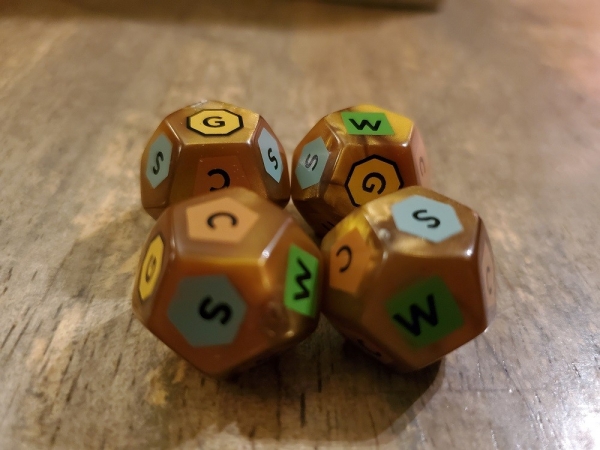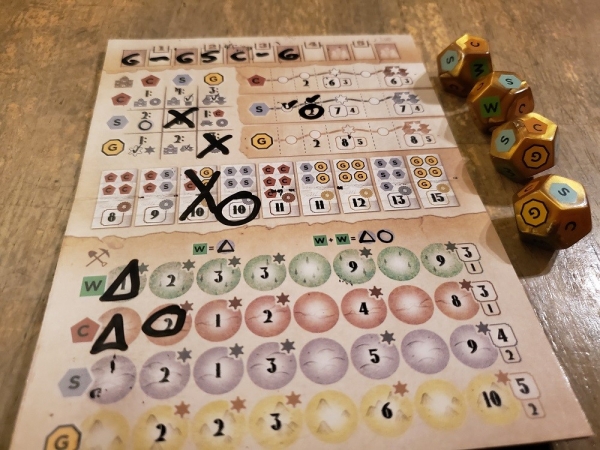Reporter: Welcome,Ladies and Gentlemen, to the Gold Rush. Where plucky pioneers are braving the arid landscape to seek their fortune. Excuse me, Sir, can you tell us about what you are doing out here.
Man: Pickax Pete is the name, Precious Metal are my game. I'm racing to make shipments of Copper, Silver and Gold. I'm currently leading in both Silver and Copper.
Reporter: Thank you Peter. And over here we find Mrs....
Woman: Tammy Tentpole. I've been creating settlements, you can find me down in the high-rent Gold District.
Reporter: And you, sir, what are your feelings on the Gold Rush?
First Time Player: Err, I have no idea what I am doing.
Reporter: Excuse me?
First Time Player: Lots of choices...I think...But I have no idea where to start. Maybe I'll grab this boom town. * opens instructions and reads while walking * This one gives a bonus for Copper Shipped and Copper in contracts...do I have any of those... * Trips over a rock and tumbles down into a valley *
Reporter: Well, there you have it. Welcome to the Rolled West Gold Rush. Back to you, Ron.
There always seems to be plenty of choices to be made in Rolled West: Build Settlements, make Shipments of different types of metal, fulfill open contracts for precious resources, or invest in Boom Towns. But it really only provides an illusion of a multitude of scoring paths. Most of the games will be pretty close scoring wise but only because you really don't have a chance to “break out” in the six rounds of gameplay. Probably the most damning thing about this illusion of choice is that it feeds anyone with Concentration Constipation. They will investigate every possible way to score on every turn and lament over which choice to make, turning what should be a quick game into a slog through a variety of dead end scoring choices on every turn.
You roll four dice on your turn then always set one aside that will used to select the type of terrain you can build settlements on in this turn. You do NOT use it for anything else. Seems simple enough, right? But, be prepared for this to be the thing that trips up everyone for the first few plays. I'm not sure what makes it unintuitive but it is the one rule everyone just can't seem to make click in their head. The 12 sided dice you are rolling are pre-stickered which means they don't qualify as “Cool Chunky Dice” under the Geneva convention.

You are always at the mercy of the dice in Rolled West. Whatever plan you might have in your head can be thwarted by simply not getting the faces that you need. You can somewhat mitigate this with the “banking” system. This allows you to “bank” a dice for use on your turn from one of your neighbor's rolls. This also works to keep you engaged on other players turns. Even if you are playing with the full four players that the game supports, you only have one turn that you don't have to be paying attention to the dice. Just be aware that you aren't allowed to “bank” the dice that another player sets aside as their terrain (Just another reason that mechanism feels like a stumbling block). You can also bank a dice that you don't use on your own turn to be used later down the line.

You'll recognize that the Boom Towns you can purchase feel like bonus objectives found in a variety of other games. But they are more reactive than proactive. Where a bonus objective would normally give you a general path to follow, the randomness inherent in a dice-based game means you can't really determine what path you will be able to follow. Instead of picking a Boom Town to decide what direction to take, it is a better plan to set off on the path that the dice lead you and pick up boom towns that enhance what you have already achieved. But, be prepared to pass the instructions around when someone decides to purchase one....and don't expect the one you really want to be available for what dice you rolled this turn. If you have been banking a variety of different resources, you'll probably be able to pick whichever one you want but if you decided to take a more focused path, they may elude you.

I do like the interaction that Rolled West has between the players. Between picking a dice to bank (which doesn't directly impact other players, you aren't taking them from them, just using them too) and closing down better scoring opportunities by securing them first, you aren't stuck playing head down solitaire when engaged in this game.
The biggest issue I found with Rolled West is that it never really follows though on the unstated promise that once you “get it” the game will open up. The initial plays are likely to leave first time players confused as to what direction to take. But, once you do grasp how to best score points, you find that the path you want to take is often blocked by what dice/resources you have to spend. It never really “filled” what I desire in a twenty to thirty minute filler.
A review copy of this release was provided by the publisher. Therewillbe.games would like to thank them for their support.
 Games
Games How to resolve AdBlock issue?
How to resolve AdBlock issue? 






















